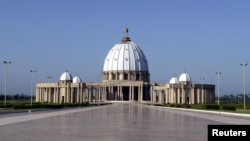"The determination to transfer the capital to Yamoussoukro exists, what's lacking is the resources," said regional governor Augustin Thiam.
It was the dream of the first post-colonial president, Felix Houphouet-Boigny, who wanted to turn the village of his birth, N'Gokro, into the political center. The decree was issued on March 21, 1983.
Gradually the city emerged and was renamed in honor of Yamousso, a queen of the regional Baoule ethnic group and a great-aunt of the man revered as "FHB".
"Above all, Felix Houphouet-Boigny wanted to correct the colonial legacy and not have everything concentrated in a single town," said Jean-Noel Loucou, director of the former leader's namesake peace research institute in Yamoussoukro.
"The idea in creating this capital was to demonstrate African ingenuity with a distinctive architecture ... and with plenty of green space," he told AFP.
Four decades later, the former agricultural village is home to 300,000 people but few national institutions - only the Senate and the national chamber of traditional chiefs and kings have been transferred to the city.
On its edge, plants overrun the abandoned construction sites for a National Assembly and a presidential palace, launched by former president Laurent Gbagbo.
The city is already a tourism magnet, not least for its stately canals filled with caymans - a cousin of alligators - and the modernist stylings of buildings such as the Houphouet-Boigny foundation.
Also visible from nearly every corner is the imposing Our Lady of Peace basilica, which at 158 meters is one of the tallest religious structures in the world.
"Houphouet tried to build Yamoussoukro bit by bit on three pillars: education with its major schools, religion with the basilica, and tourism," said Nanan Kouassi Konan, chief of the neighboring village of Kami, one of the former president's homes while growing up.
"The city is at a strategic location, a crossroads in the centre of the country. Everyone passes through here," he said.
In recent years, the city has indeed become a haven for people seeking respite from the bustle of Abidjan and its six million residents, or for villagers leaving the land.
Serge Pokou, a farmer and hotel operator, made the move with his family a few years ago.
"Naturally I chose the calm of Yamoussoukro and its mix of the country and a modern city, with its African heritage preserved," he said.
City officials now aim to build up an economic base beyond tourism, with plans for an industrial zone that could attract more businesses.
"The major schools in Yamoussoukro struggle to retain their engineers and technicians, because there's no industry here," Loucou said.
Pokou agreed, "But we need to make sure we maintain the city's identity and its tranquility, which above all are the reasons people live here or want to come."




